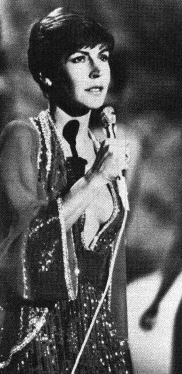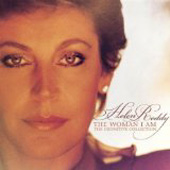|
Helen Reddy was born in Melbourne, Australia, the daughter of show business parents. In 1966, she won a television talent contest, and was sent to America in search of fame and fortune. Within a few months, she'd met and married an assistant mailroom boy, Jeff Wald, who became her manager. Twenty-seven labels rejected Helen before she was finally signed by Capitol Records in 1970. Her first song, "I Don't Know How to Love Him," was one Helen never liked, and agreed to record as a B side for one of her singles. However, Jeff, armed with a credit card and a phone, worked eighteen hours a day, phoning radio stations, pleading for air play. His efforts turned "I Don't Know How to Love Him" into a Top 20 hit in the spring of 1971.
In 1972, Helen wrote a feminist anthem, "I Am Woman," which became a number one record and earned her a Grammy. Her next single, "Peaceful," was also a hit. And then came the high water mark of her career: an enigmatic number, "Delta Dawn." "It's a song about women's liberation," explained co-composer Alex Harvey. "That was a big deal at the time, and I guess it still is. "I like images a lot, and mystery, and I think the mystery of 'Delta Dawn' is what pulled it together. The song basically came out of a feeling that I had for my mother, but I'm not really sure. "I cut the song in Nashville for my first Capitol album. One of the background singers on that session was Tracy Nelson, who had her own band, Mother Earth. She got booked at the Bottom Line in New York City, and added 'Delta Dawn' to her act. A fan of hers, Bette Midler, heard the tune and was hypnotized by it. She came every night and learned the song exactly the way Tracy did it. Bette then began to perform the song at the Continental Baths in New York. It got an immediate reaction. She sang the song three different times on the Johnny Carson show. "Billy Sherrill, who worked for Columbia-Epic, had a thirteen-year-old girl named Tanya Tucker under contract. He was going to produce her, but hadn't yet chosen any material. Once he heard Bette do 'Delta Dawn' on TV, he knew the song could be a smash. So, right after the release of Bette's first album, The Divine Miss M, he put out a country version by Tanya. Well, that single began to take off. Then, Tom Catalano, who was producing Barbra Streisand, decided that Barbra could cut 'Delta Dawn' for the pop market and have a big hit. In her absence, he cut an instrumental backing track, brought her down to the studio, and then played it for her. She didn't like the tune, and refused to put her voice on it. So, Wally Schuster -- a song plugger for United Artists Music -- called up Jeff Wald and asked if Helen might be interested. They made a deal, Helen put her voice on the track, and the rest was history. Helen's single took off immediately in the summer of 1973.
Helen Reddy went on in the seventies to solidify her position as one of the most successful female hitmakers of the decade. Later in 1973 she scored with "Leave Me Alone (Ruby Red Dress)"; and in 1974, "Keep On Singing," "You and Me Against the World" and "Angie Baby." In 1975 there were "Emotion," Bluebird," "Ain't No Way to Treat a Lady" and "Somewhere in the Night." Her last big singles were "I Can't Hear You No More"/"Music Is My Life" (1976) and "You're My World" (1977). In recent years, Helen has branched out into acting. Her television specials have been seen in over forty countries, while her starring role in the Disney film, Pete's Dragon, continues to attract a new generation of fans. "I am out of the record business," she said in 1997. "I really want to concentrate on live performing." Helen has also performed in the stage productions "Shirley Valentine," "Call Me Madam," "Anything Goes," "The Mystery of Edwin Drood" and "Blood Brothers," which marked her Broadway debut. With theater work keeping her out of wide view, Helen says that she can often go about her Los Angeles neighborhood unrecognized -- a pleasant change from the days when her 1982 divorce from Jeff Wald erupted into a front-page battle over his cocaine use and custody of their son Jordan. She divorced for a third time in the late nineties, this time amicably, and says she has no interest in marrying again. "What can any man give me that I can't give myself?" Helen asks. "I've had dinner at the White House. I've met Prince Charles. I never imagined the richness of my life."
No comments so far, be the first to comment. |


